The speech and those transformative days of March ‘71
The days of March 1971 are among the most crucial in the history of Bangladesh's struggle for independence. Events in this month are a combination of the finest (the March 7 speech) and the most tragic (the beginning of the genocide against us). It began with a spontaneous protest at Dhaka Stadium when the crowd, while watching a game, burst out in rage at the news that Pakistani President Gen Yahya Khan had postponed the convening of the National Assembly, and ended with the massacre in Dhaka and elsewhere, marking the beginning of the genocide on the night of the 25th, the Declaration of Independence, arrest of Bangabandhu by the Pakistanis, and the start of our Mukti Juddho.
For those of us who had the good fortune of being a part of those supremely inspiring days, we know that each day was full of dreams, self-awareness, determination, and expression of love for our country, culture, and mother tongue. For those of us who were students of Dhaka University—the nerve centre of nationwide student activities—each day unfolded as if opening a new chapter in our nationalistic struggle. Each day was a rebirth of our determination, strengthening of our resolution, and signified our ever-rising confidence—all mixed with an overwhelming feeling of euphoria.
March 7, the day Bangabandhu brought the nation to its feet and had us all shouting from the top of our voice "Joy Bangla" as he delivered a historic speech. It marked that unique moment when our dreams found a most powerful, articulate, and mesmerising expression which clarified our thinking and gave our voices a new level of confidence and power. The speech brought us nearer to what we were fighting for. It suddenly removed all residue of confusion and hesitancy and unified us all into one massive force for independence. The speech was a beautiful blend of clarity for us and calculated vagueness for the enemy. For us, it was a clear and unambiguous declaration of independence. But for the Pakistanis, they could not technically term it as a call for secession and trigger the genocide, which of course they did on the night of March 25.
The more I hear the speech, the more I am amazed by its magnificent balance, its inspirational message, its historical foundation, its rhetorical flare, its choice of words, the undulation of voice and the rhythm of its flow. What makes the speech a world treasure and brought it Unesco recognition is the magnetism of Bangabandhu's words and the brave, defiant, and flawless articulation of a nation's aspiration for freedom. The points of emphasis, bringing out the significance of some words over others, and the speech's poetic rendering makes it enduring, endearing, and something that resonates in our hearts even after 53 years.
Another history-making event that occurred in March 1971 was the non-violent and non-cooperation movement that took place following Bangabandhu's call on March 7. The whole nation responded as one. The people of East Pakistan totally boycotted the Pakistani "state" in all its forms, which stood totally delinked from the people that it was supposed to govern. It was an unique instance—more effective than Mahatma Gandhi's similar calls against the British colonial state—which defied every branch of the state structure and accepted the directive of one man standing against a military state. Having lived through all those days, I can only marvel at the allegiance people in general exhibited for their leader. Bangabandhu's orders were the law which did not need a single policeman to be enforced. The ferocious and most coercive state machinery of Pakistan stood helpless, and people spontaneously and fearlessly followed Bangabandhu's directives to the dot.
Seldom can we witness such a sight in the annals of history when people's power stands in such dramatic, liberating, and defying contrast to the oppressive machinery of the state. Suddenly, Pakistan seemed like a house of cards, a farce of a state nothing more than a bystander to people taking power in their own hands. It was just a few words of one man that stood towering against the formidable bureaucracy, the vicious police force, the intricate intelligence network, and mountains of money ready to be spent to create chaos. What made the whole thing more unbelievable was the discipline of the masses. There was practically no looting, no breaking of the law, no breach of discipline, and no instance of putting personal interest above the collective interest of the people. Like men, there were thousands of women in our everyday processions and there was not a single instance of an untoward incident. It was the finest and brightest hour for the student community of the country, and especially for all the universities—epitomised by our Dhaka University.
As I recall—as an active member of East Pakistan Students Union (EPSU)—those days of endless processions around the city, of countless street-corner meetings, of mass contact to pass on the message of our independence and that of Bangabandhu, what love and warmth we received from all. Every street corner was a welcoming spot, a place of convergence, and a point of confluence of hundreds of processions coming from all directions; how enthusiastically the general people would extend their support, how spontaneously and invigoratingly shopkeepers, street hawkers, ordinary pedestrians would repeat our slogans. Many would take over from us to lead slogans as the messages of our slogans—like "Bir Bangali austro dhoro, Bangladesh shadhin koro"—touched their inner core. The feeling was truly of being in the midst of an ocean of people, part of a tsunami of irresistible force formed not by nature but by each one of us. Pakistan's demise was written on the face of every one of the millions of us who were out on the streets back then.
But while we united for freedom, our enemy was preparing for a brutal response. Under the guise of talks, Gen Yahya prepared one of the greatest betrayals in history. Seldom are there instances of a country's own army—whose very existence was paid for with our tax money—turning their guns towards their own unarmed and helpless people. On the night of March 25, genocide began. It can be termed as one of the earlier instances of ethnic cleansing. I hid myself on that night at a friend's house, from whose rooftop I saw the first glimpses of the devastation that fell upon Dhaka University students and teachers. I went to the Shaheed Minar to connect with my fellow student activists upon the first lifting of curfew on the morning of March 27 and saw the dead bodies at Jagannath Hall and on the nearby railway tracks, on two sides of which were slums. (The railway line has now been turned into roads).
Much has been written on the genocide that started on March 25, 1971 and much more needs to be written to bring to light the true scale of the barbarity inflicted on us. We need to spend more resources and efforts to unearth the total story and then place it before the world.
Another day of significance was March 2, the day our national flag (later reformed) was hoisted in the arts faculty building of Dhaka University. I recall joining the gathering and seeing the green-and-red flag, with our map in yellow, fluttering in many hands. I distinctly remember ASM Abdur Rab, VP of DUCSU, standing tall in one corner of the roof of the portico with courage and pride which engulfed us with an overwhelming sense of purpose. Hoisting the flag marked a supremely important psychological moment that signified a snapping of connection with Pakistan. Loyalty to one's own flag is vital and its place in one's psyche is etched deeply. When that loyalty shifts to another flag, it marks the beginning of a new reality. Suddenly, we had a symbol, an insignia that became the repository of our deepest urge to be recognised for what and who we were. Raising that small piece of cloth told the story of our struggle and proclaimed the coming to life of our dream.
March '71 in our nation's lifetime is full of events to celebrate and lessons to learn from. For those of us who were part of those eventful days, it is like living through a life-transforming dream filled with purpose and participation. Those days were also filled with deeply felt sorrow and never-ending sadness. But for those of the succeeding generations, there are many lessons to be learned for the purpose of nation-building: sacrifice, determination, self-confidence and, most importantly, steadfast belief in our future.

 For all latest news, follow The Daily Star's Google News channel.
For all latest news, follow The Daily Star's Google News channel. 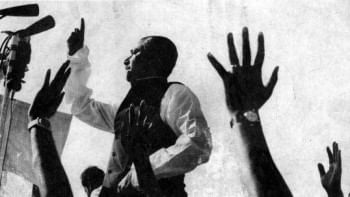



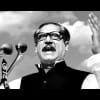
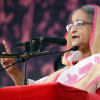
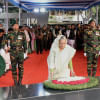
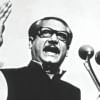


Comments